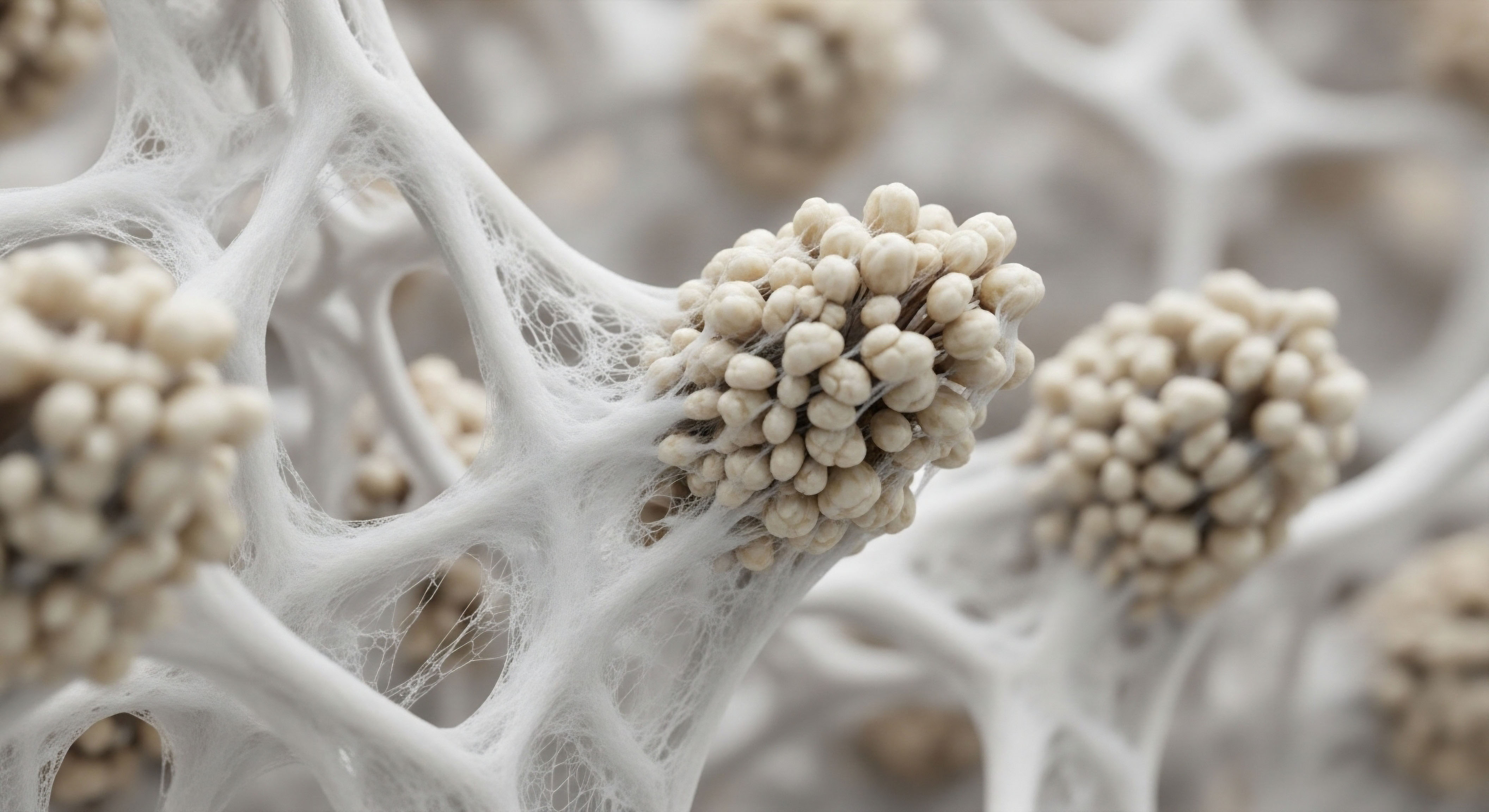

Fundamentals
Many individuals recognize a subtle, yet persistent, shift in their vitality and function over time. These experiences often present as unexplained fatigue, changes in body composition, or shifts in mood and cognitive clarity, leading to a profound sense of disconnection from one’s optimal self. Such sensations are deeply personal, prompting a desire to understand the biological underpinnings of these shifts. The intricate dance of our endocrine system, orchestrating hormonal balance, plays a central role in these lived experiences.
Understanding how lifestyle choices influence hormone receptors offers a compelling pathway toward reclaiming robust health. Our biological systems possess a remarkable adaptability, a concept encapsulated by the field of epigenetics. Epigenetics describes modifications to gene expression that occur without altering the underlying DNA sequence itself.
These modifications act as a sophisticated control layer, determining which genes are active or quiescent at any given moment. Crucially, these epigenetic adjustments are highly responsive to environmental and lifestyle signals, effectively bridging the gap between daily habits and our genetic blueprint.
Epigenetic modifications represent a dynamic interface, translating daily experiences into instructions for gene activity within our cells.
Hormone receptors, specialized proteins located on or within cells, receive hormonal signals, initiating a cascade of biological responses. The number of these receptors, their sensitivity, and their ability to bind hormones are all subject to epigenetic regulation. Lifestyle factors, ranging from dietary patterns to stress exposure, profoundly influence these epigenetic markers, thereby recalibrating how our cells perceive and respond to hormonal messages. This means your daily choices directly impact the very communication channels that govern your endocrine health.

What Are Epigenetic Mechanisms?
Epigenetic mechanisms primarily involve three key processes that dictate gene expression.
- DNA Methylation ∞ This process involves the addition of a methyl group to a cytosine base within the DNA sequence, typically at CpG sites. Methylation generally acts as a molecular “off” switch, compacting DNA and restricting access for the cellular machinery responsible for gene transcription. Alterations in DNA methylation patterns significantly affect the expression of genes encoding hormone receptors.
- Histone Modification ∞ DNA wraps around proteins known as histones, forming structures called nucleosomes. Histone modifications, such as acetylation or deacetylation, change how tightly DNA is wound around these histones. Acetylation generally loosens the DNA structure, making genes more accessible for expression, while deacetylation condenses it, reducing gene activity. These modifications directly influence the accessibility of hormone receptor genes to transcription factors.
- Non-coding RNAs ∞ Small RNA molecules, including microRNAs (miRNAs), regulate gene expression by binding to messenger RNA (mRNA) molecules, preventing their translation into proteins or promoting their degradation. MiRNAs play a substantial role in modulating the expression levels of various hormone receptors, offering another layer of epigenetic control.
These molecular mechanisms do not alter the fundamental genetic code, yet they possess the power to fundamentally reshape cellular function and, by extension, the intricate balance of the endocrine system. The implications for personal wellness protocols are substantial, offering avenues for targeted interventions that extend beyond conventional approaches.


Intermediate
Individuals seeking to understand the ‘how’ and ‘why’ of their health fluctuations often arrive at a crucial realization ∞ the body’s internal messaging system, the endocrine network, is profoundly influenced by daily existence. Lifestyle choices, perceived as routine, orchestrate a complex symphony of epigenetic changes that directly impact hormone receptor function. These modifications, in turn, redefine cellular responsiveness to vital endocrine signals.

How Does Nutrition Influence Receptor Epigenetics?
Nutritional intake stands as a formidable epigenetic modulator. The foods consumed provide the building blocks and cofactors necessary for enzymatic reactions involved in DNA methylation and histone modification. Methyl-donor nutrients, such as folate, vitamin B12, and methionine, directly influence the availability of S-adenosylmethionine (SAMe), a universal methyl donor essential for DNA methylation. A diet rich in these nutrients supports the maintenance of appropriate methylation patterns, including those on genes encoding hormone receptors.
Conversely, deficiencies in these critical nutrients can lead to aberrant methylation patterns, potentially silencing beneficial genes or activating detrimental ones. For example, specific dietary components, such as polyphenols found in fruits and vegetables, influence DNA methyltransferases and histone deacetylases, enzymes that add or remove epigenetic marks. These bioactive compounds can help normalize methylation patterns and enhance gene expression, including those of key hormone receptors.
Dietary components serve as potent signals, directly influencing the molecular machinery that governs hormone receptor expression.
The impact of nutrition extends to various hormone receptors. Research indicates that diets influence the epigenetic regulation of insulin signaling genes, including PPARγ and IRS1, affecting insulin sensitivity and metabolic function. Moreover, specific dietary patterns, such as the Mediterranean diet, are associated with beneficial epigenetic changes related to inflammation and cardiovascular health, indirectly supporting optimal hormone receptor function.

Exercise and Epigenetic Remodeling of Hormone Receptors
Physical activity initiates a cascade of physiological adaptations, extending to the epigenome. Regular exercise has a significant impact on DNA methylation and histone modifications across numerous genes, including those involved in hormone signaling and receptor expression. Both acute exercise sessions and long-term training programs induce changes in DNA methylation status and histone acetylation in skeletal muscle and other tissues.
These exercise-induced epigenetic changes can enhance the expression of androgen receptors (AR) in tissues like the hippocampus, influencing neurogenesis and overall neurological function. Exercise also influences the expression of genes related to metabolic processes, such as glucose transporter 4 (GLUT-4) and peroxisome proliferator-activated receptor gamma coactivator 1-alpha (PGC-1α), through epigenetic mechanisms, thereby improving insulin sensitivity and mitochondrial biogenesis.
The mechanisms often involve the activation of cellular energy sensors, such as AMPK, which in turn influences histone modifying enzymes. This leads to a more open chromatin structure, facilitating the transcription of genes vital for metabolic adaptation and hormone receptor responsiveness. These adaptations highlight how physical movement directly recalibrates the cellular machinery to optimize hormonal responses.

The Role of Stress in Epigenetic Modulation
Chronic psychological stress exerts a profound influence on the endocrine system, primarily through the hypothalamic-pituitary-adrenal (HPA) axis and its primary effector, cortisol. Sustained elevation of cortisol levels induces epigenetic changes, particularly in the glucocorticoid receptor (GR) gene. These modifications, including DNA methylation and histone alterations, affect the expression and sensitivity of GRs, altering the body’s ability to regulate its stress response.
Aberrant methylation of the GR gene promoter, specifically exon 17, has been linked to altered GR expression and increased vulnerability to stress-related conditions. These stress-induced epigenetic marks can be long-lasting, shaping an individual’s coping strategies and contributing to the development of mood and psychiatric disorders. Understanding this intricate connection offers a compelling rationale for stress management techniques as essential components of any wellness protocol.
Here is a summary of how lifestyle factors affect epigenetic markers ∞
| Lifestyle Factor | Primary Epigenetic Marker Affected | Impact on Hormone Receptors |
|---|---|---|
| Nutrition | DNA Methylation, Histone Modification | Alters expression and sensitivity of insulin receptors (PPARγ, IRS1), estrogen receptors. |
| Exercise | DNA Methylation, Histone Modification | Enhances androgen receptor expression, improves insulin receptor sensitivity (GLUT-4, PGC-1α). |
| Chronic Stress | DNA Methylation, Histone Modification, miRNAs | Modifies glucocorticoid receptor (GR) expression and sensitivity, affecting stress response. |
| Environmental Toxins | DNA Methylation, Histone Modification, miRNAs | Disrupts estrogen and androgen receptor function (Endocrine Disrupting Chemicals). |
| Sleep Quality | DNA Methylation, Histone Modification | Influences circadian rhythm genes, impacting various hormone receptor expressions. |


Academic
The sophisticated interplay between lifestyle and the endocrine system, mediated by epigenetic mechanisms, reveals a profound avenue for understanding and influencing human vitality. This intricate dance extends to the very core of cellular communication, dictating the expression and functional efficacy of hormone receptors. A deep exploration of this molecular landscape offers precise insights into personalized wellness protocols.

Epigenetic Modulation of Estrogen Receptor Alpha Expression
Estrogen receptor alpha (ERα), encoded by the ESR1 gene, plays a critical role in numerous physiological processes, including reproductive function, bone density, cardiovascular health, and neuroprotection. The epigenetic regulation of ERα expression is a particularly well-studied area, demonstrating how lifestyle factors exert control over hormonal responsiveness.
DNA methylation of the ERα gene promoter is a key epigenetic marker influencing its transcription. Hypermethylation of specific CpG sites within the ERα promoter region often correlates with decreased receptor expression, thereby reducing cellular sensitivity to estrogen.
For instance, studies reveal that ERα promoter methylation increases with age, contributing to age-related declines in estrogen sensitivity across various tissues, including hippocampal regions vital for cognitive function. Environmental factors, including endocrine-disrupting chemicals (EDCs), further influence ERα epigenetic patterns.
EDCs can alter DNA methyltransferase activity, leading to aberrant methylation of ERα, thereby disrupting estrogen signaling and contributing to metabolic dysfunction and reproductive health concerns. The intricate mechanisms involve not only direct binding of EDCs to nuclear hormone receptors but also their impact on miRNA expression, which in turn regulates ERα levels.
The epigenetic landscape of estrogen receptor alpha is a dynamic canvas, sculpted by environmental cues and profoundly impacting cellular sensitivity to estrogen.
Histone modifications also critically govern ERα expression. Acetylation of histones associated with the ESR1 gene generally promotes a more open chromatin configuration, facilitating gene transcription. Conversely, histone deacetylation leads to a condensed chromatin state, suppressing ERα expression. Lifestyle interventions, such as dietary modifications rich in compounds like sulforaphane or polyphenols, influence histone deacetylase (HDAC) activity, offering a pathway to modulate ERα expression epigenetically.

Androgen Receptor Epigenetics and Lifestyle Interventions
The androgen receptor (AR) mediates the actions of androgens, such as testosterone and dihydrotestosterone, crucial for male reproductive health, muscle anabolism, bone density, and neurocognitive function. Epigenetic modifications play a significant role in determining AR expression and sensitivity in various tissues. DNA methylation of the AR gene promoter influences its transcriptional activity, with hypomethylation generally associated with increased AR expression.
Physical exercise emerges as a powerful modulator of AR epigenetics. Research indicates that exercise can increase AR mRNA expression in tissues like the hippocampus, potentially through epigenetic mechanisms. This suggests that physical activity can recalibrate cellular responsiveness to androgens, impacting processes such as neurogenesis and muscle protein synthesis. The precise molecular events involve changes in DNA methylation patterns and histone modifications in response to contractile activity and metabolic shifts induced by exercise.
The impact of lifestyle on AR epigenetics is particularly relevant for men undergoing testosterone replacement therapy (TRT). Optimizing the epigenetic environment through diet and exercise can potentially enhance the efficacy of exogenous androgens by promoting favorable AR expression and sensitivity in target tissues. This holistic approach supports a more robust and sustained physiological response to hormonal optimization protocols.

Glucocorticoid Receptor Epigenetics and Chronic Stress Adaptation
The glucocorticoid receptor (GR), encoded by the NR3C1 gene, is central to the body’s stress response and metabolic regulation. Epigenetic modifications of the GR gene, particularly at its promoter regions, are highly sensitive to chronic stress exposure and early life adversity. These modifications profoundly affect GR expression and the overall functioning of the hypothalamic-pituitary-adrenal (HPA) axis.
Chronic stress induces increased DNA methylation at specific CpG sites within the GR exon 17 promoter, particularly in the hippocampus. This hypermethylation leads to reduced GR expression, impairing the negative feedback loop of the HPA axis and contributing to a dysregulated stress response. Such epigenetic imprints, established early in life or accumulated through prolonged stress, influence an individual’s vulnerability to mood disorders and metabolic dysregulation.
Histone modifications, including acetylation and methylation, also regulate GR expression. Stress often leads to decreased histone acetylation and increased repressive histone methylation at the GR promoter, further suppressing its expression. These changes collectively contribute to a diminished capacity for stress adaptation. Targeted interventions aimed at stress reduction, such as mindfulness practices or adequate sleep, can potentially reverse some of these adverse epigenetic marks, restoring GR sensitivity and promoting resilience.
The following table illustrates key epigenetic markers and their functional consequences on hormone receptors ∞
| Epigenetic Marker | Mechanism | Consequence for Hormone Receptors |
|---|---|---|
| DNA Methylation | Addition of methyl groups to CpG sites in promoter regions. | Generally suppresses receptor gene expression, reducing receptor count or sensitivity. |
| Histone Acetylation | Addition of acetyl groups to histones. | Loosens chromatin, increasing accessibility for transcription, often enhancing receptor gene expression. |
| Histone Deacetylation | Removal of acetyl groups from histones. | Condenses chromatin, reducing accessibility for transcription, often suppressing receptor gene expression. |
| MicroRNAs (miRNAs) | Binding to mRNA, inhibiting translation or promoting degradation. | Directly modulates the abundance of hormone receptor proteins. |

How Do Epigenetic Markers Shape Hormone Receptor Sensitivity?
The sensitivity of a hormone receptor, a critical determinant of cellular response, is not solely dependent on the presence of the receptor protein. Epigenetic modifications influence not only the quantity of receptors expressed but also their functional capacity. For instance, alterations in DNA methylation around binding sites for transcription factors can affect how strongly these factors interact with the receptor gene, thus fine-tuning its expression.
Furthermore, epigenetic marks can influence the expression of co-regulators ∞ proteins that interact with hormone receptors to either enhance or inhibit their activity. Changes in the epigenetic landscape of these co-regulator genes can indirectly yet profoundly impact the overall sensitivity and signaling output of the hormone receptor complex. This systems-biology perspective reveals that optimizing hormonal health extends beyond simply addressing hormone levels; it encompasses recalibrating the cellular environment to ensure receptors are both abundant and functionally responsive.

What Are the Implications for Personalized Wellness Protocols?
The deep understanding of how lifestyle shapes epigenetic markers on hormone receptors offers a powerful framework for personalized wellness. Protocols for hormonal optimization, such as testosterone replacement therapy (TRT) for men and women, or growth hormone peptide therapy, gain enhanced efficacy when integrated with epigenetic-aware lifestyle strategies.
For example, men undergoing TRT might experience improved androgen receptor sensitivity through targeted exercise and nutritional support, leading to more profound and sustained clinical benefits. Similarly, women navigating peri- or post-menopause can optimize estrogen and progesterone receptor function through lifestyle choices that support favorable epigenetic profiles, complementing hormonal optimization protocols.
The insights from epigenetic research also inform peptide therapy. Peptides like Sermorelin or Ipamorelin, which stimulate growth hormone release, work through specific receptor pathways. An epigenetically optimized cellular environment can enhance the responsiveness of these receptors, maximizing the therapeutic benefits of such interventions. The profound value lies in harmonizing exogenous therapies with the body’s innate regulatory mechanisms, creating a synergistic effect that promotes sustained vitality and function.

References
- Dolinoy, D. C. Jirtle, R. L. & Skinner, M. K. (2012). Environmental Epigenomics and Disease Susceptibility. Environmental Health Perspectives, 120(4), A152-A159.
- Feil, R. & Fraga, M. F. (2011). Epigenetics and the Environment ∞ Emerging Patterns and Implications. Trends in Genetics, 27(11), 405-414.
- Holliday, R. (2006). Epigenetics ∞ A Historical Overview. Epigenetics, 1(2), 76-80.
- Hurley, L. L. & Prins, G. S. (2012). Estrogen Receptor Alpha Promoter Hypermethylation in Prostate Cancer ∞ A Potential Epigenetic Marker. Endocrine-Related Cancer, 19(4), R195-R210.
- Jaenisch, R. & Bird, A. (2003). Epigenetic Regulation of Gene Expression ∞ How the Genome Integrates Intrinsic and Environmental Signals. Nature Genetics, 33(Suppl), 245-254.
- López-Otín, C. Blasco, M. A. Partridge, L. Serrano, M. & Kroemer, G. (2013). The Hallmarks of Aging. Cell, 153(6), 1194-1218.
- Reul, J. M. & Holsboer, F. (2002). Corticotropin-Releasing Hormone and Glucocorticoid Receptors in Depression and Anxiety. Nature Reviews Neuroscience, 3(1), 57-67.
- Szyf, M. (2015). DNA Methylation and Cancer ∞ A Historical Perspective. Translational Oncology, 8(5), 335-341.
- Tsankov, D. Renthal, W. Kumar, A. & Nestler, E. J. (2007). Epigenetic Regulation in Psychiatric Disorders. Nature Reviews Neuroscience, 8(5), 355-367.
- Waterland, R. A. & Jirtle, R. L. (2003). Transposable Elements ∞ Targets for Early Nutritional Effects on Epigenetic Gene Regulation. Molecular and Cellular Biology, 23(15), 5293-5300.

Reflection
The journey into understanding epigenetics and its influence on hormone receptors reveals a profound truth ∞ your biological systems are not static. Each choice you make, from the foods you consume to the way you manage stress, contributes to a dynamic dialogue with your genetic expression.
This knowledge is not merely academic; it serves as a powerful invitation to introspection, prompting consideration of your own health trajectory. The information presented here represents a foundational step, a compass guiding you toward a deeper comprehension of your unique biological blueprint.
A personalized path toward reclaiming vitality and function requires bespoke guidance, acknowledging the intricate individuality of your physiology. Consider this exploration a catalyst, empowering you to engage proactively with your wellness journey and to seek the tailored support that honors your specific needs and aspirations.



